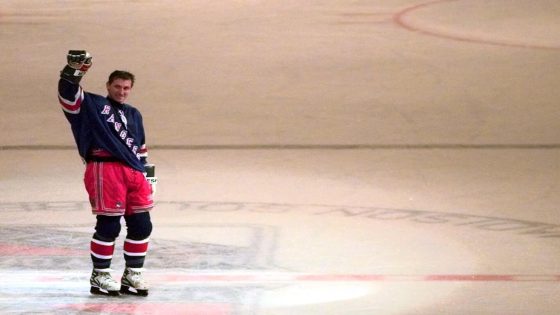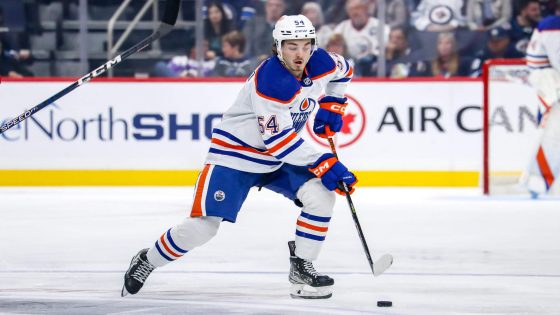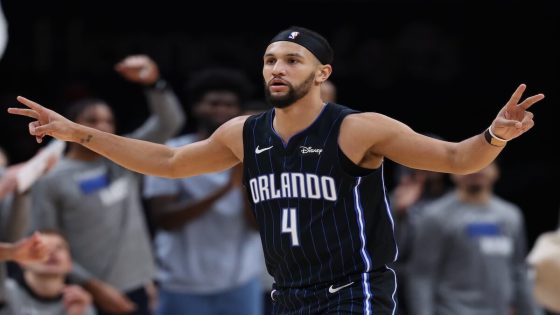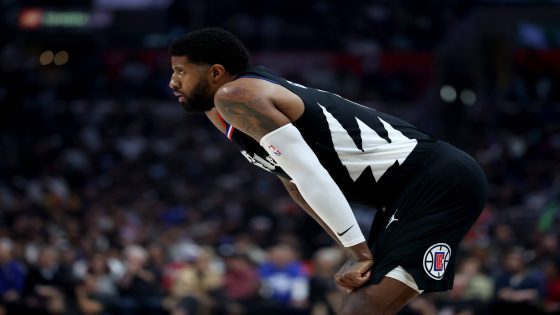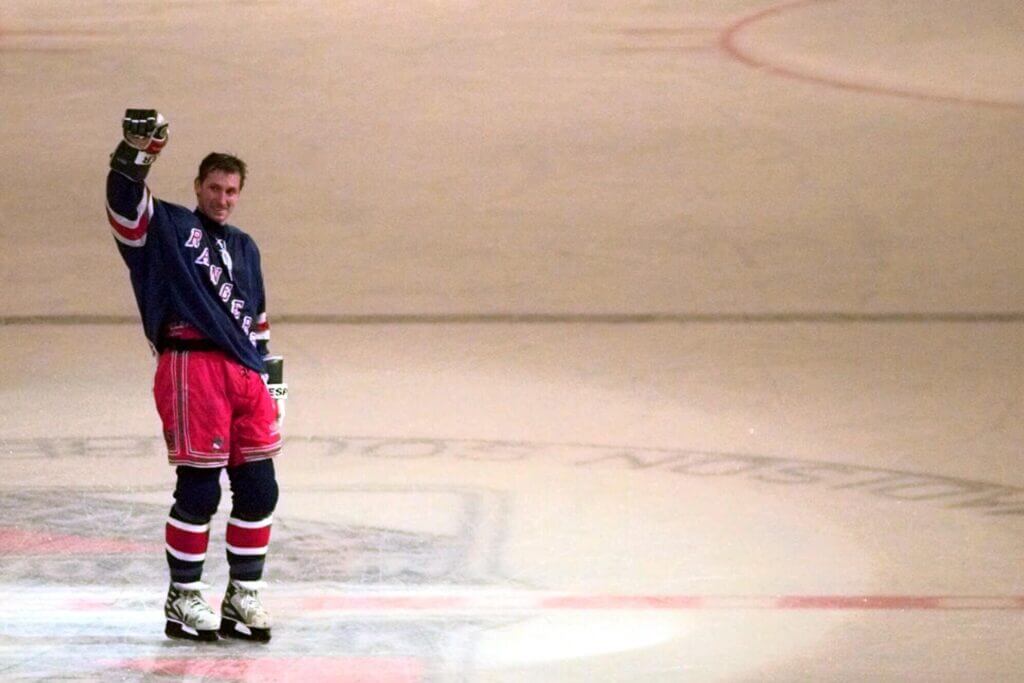
On April 19, 1999, The New York Times sports section gave a full-page treatment to the final game of Wayne Gretzky’s 21-year professional hockey career. The photo showed Gretzky, postgame, skating a solo lap, waving to the crowd, savoring the moment. Near the bottom of the page was the final tally on the most productive career in NHL history: 894 goals, 1,963 assists, 2,857 points. All records then. All are still standing today.
The story featured an observation from Wayne’s father, Walter. When he was asked what might be next for his son, Walter replied: “For the first few months, he’s going to play golf. I know he’ll never be a coach or general manager; they have the tough jobs. TV? I doubt that very much.”
And the headline, on top of it all, read: The Great Goodbye.
So here we are, on the 25th anniversary of Gretzky’s final NHL game, and Walter’s prediction proved half right. Wayne did play a lot of golf. Still does. He never became an NHL general manager, but for a time (from 2005 to 2009), he was the head coach of the Phoenix Coyotes. As for television, Gretzky is in his second season as a part-time panelist on the TNT broadcasts of NHL games.
Gretzky isn’t there every week — probably because he doesn’t want to be at a certain place at a certain time every Wednesday night of the hockey season. But even on the nights when Gretzky isn’t on the panel, you might see him during commercial breaks as a brand ambassador for BetMGM. That was Gretzky, sitting next to Vince Vaughn, exchanging hellos with Tom Brady during the betting company’s pricey Super Bowl ad.
At the height of his playing career, Gretzky once hosted “Saturday Night Live.” Nike did a series of commercials, where Bo Jackson’s peers would say into the camera: Bo knows tennis, golf, any number of sports, popular or not. Midway through the ad, Gretzky would skate into the frame, in full equipment, shake his head and ruefully say: “No.” The implication: Bo may know every other sport under the sun but doesn’t know hockey. Gretzky starred alongside Jackson and Michael Jordan in a short-lived Saturday morning cartoon called “ProStars.”
A quarter of a century after he left the NHL as an active player, Gretzky remains the face and occasionally the voice of professional hockey — for better and for worse.
His greatness helped the sport gain a cultural foothold, especially in the United States, that it hadn’t seen before and hasn’t sniffed since. In Canada, hockey is woven into the national way of life. In America, NHL players are closer to Olympic athletes in their public profile. The difference is stark, and the challenges it creates are very real.
“There’s a transcendent athlete (like Gretzky) that pulls in casual fans or non-fans, and then when that transcendent athlete retires, with them goes interest,” said Scott Kirkpatrick, a professor at Northwestern’s School of Professional Studies with more than 20 years of experience in the sports marketing industry.
“I don’t know if it’s a bad thing or a good thing, or is it just the way it is.”
No matter how many talented players have come down the pipeline — from Sidney Crosby and Alex Ovechkin to Connor McDavid and Connor Bedard — no one has penetrated the American sporting psyche the way Gretzky did. If you played word association with almost any casual sports fan and asked them to come up with a single thought about professional ice hockey, invariably Gretzky would be the first name they could conjure.
Basketball had Jordan but eventually LeBron James came along. The NFL had Brady and then Patrick Mahomes came along. Hockey’s hardcores understand how dominant Crosby was and how unique a talent McDavid is.
But hockey is also a small world compared to the NBA or the NFL and the NHL just has not been able to find a second athlete who can transcend the sport the way Gretzky did. Many of the NHL’s youngest fans have never seen him play a game.
NHL player agent Allan Walsh is a big fan of Gretzky’s contributions to growing the game in the United States but sees his lingering influence as an indictment of the game.
“There’d be no franchises in Anaheim, San Jose, Vegas or Arizona had it not been for Wayne Gretzky,” Walsh said. “Hockey in the Sunbelt has exploded as a result of his influence. But what a sad statement for the NHL that 25 years after his last game, he’s still the face of the NHL.”
The rivalry between Crosby and Ovechkin has been the focal point of NHL marketing since the two arrived in the NHL following the 2004-05 lockout. Walsh thinks the fact that it remains so important, with both in the twilight of their respective careers, means the league hasn’t done enough to capitalize on the new generation of talented, telegenic stars.
“Unfortunately, the world we live in, if you don’t market the game, a terrible thing happens — nothing,” Walsh said. “That’s what’s been happening with the NHL for a very long time.”
Edmonton Oilers general manager Ken Holland believes the reason Gretzky remains such an iconic figure is simple.
“He still holds all the records,” Holland said. “If you open the record book, and go down line by line, that’s what you see. Gretzky. Gretzky. Gretzky.”
Holland thought the closest comparison to Gretzky’s enduring impact on hockey was how Tiger Woods remains arguably the most recognizable figure in golf. Holland believes even though Woods is no longer competitive with the younger lions on the tour, interest in any event spikes if Woods is entered.
“That’s because Tiger’s created such a recognizable brand for himself,” Holland said. “Gretzky is the same way.”
How does a player accomplish that? Usually, it’s because he possesses either incredible charisma or in Gretzky’s case, proved to be so dominant that the best everyone else can hope for is to be No. 2. Casual fans know him because he was that good.
“(That dominance) transcends into other spheres. It helps elevate the sport beyond the sport,” said Kimberly A. Whitler, associate professor of business administration at the University of Virginia’s Darden School of Business.
“(Players like Gretzky) slip the jetstream to end up in mainstream, popular culture.”
At the 2019 Super Bowl, NFL Canada did a bit where they asked players on the New England Patriots and Los Angeles Rams a multiple-choice question about Connor McDavid: Was McDavid a) the Prime Minister of Canada; b) a hockey player; or c) an actor. The vast majority chose either A or C. The only player who chose B was clearly guessing. He couldn’t identify McDavid’s team and laughed.
Canada’s Prime Minister: Connor McDavid (@cmcdavid97)
That is if you’re asking the @Patriots & @RamsNFL 😂😂#SuperBowl
cc: @EdmontonOilers pic.twitter.com/q70BA1OPrX
— NFL Canada (@NFLCanada) February 1, 2019
But is it a laughing matter when someone can play at McDavid’s level, arguably the most dynamic talent in the game’s history, and other professional athletes have no idea who he is?
Generally speaking, people immersed in the business of the NHL take no issue with how Gretzky’s aura still dominates the game. But while the league has grown modestly over the past 25 years, it has fallen far behind Major League Baseball, the NFL and NBA and MLS is currently giving it a run for its money.
What would it take for a hockey player from the current generation to penetrate the larger U.S. or worldwide markets the way Gretzky did? Someone who approaches his level of competitive dominance, according to experts, or a less remarkable player who finds a way to fill in the gap. For hockey players, those are two steep mountains to climb.
“You either have a personality that transcends the sport, like a Dennis Rodman, or you have a player who is a generational, transcendent sort of player, like Caitlin Clark, who people just want to see do something phenomenal,” Whitler said. “And then that brings eyeballs to the sport.”
The NHL does have a rare opportunity right now. In the past, many of the game’s greats were from Canada and then from Europe. It’s easier to market U.S. athletes to U.S. audiences and there’s never been more American-born players starring at the NHL level.
The new first family in hockey is the Hughes family — Jack, Quinn and Luke, two outright stars of the game, one a rookie-of-the-year candidate. And if it isn’t the Hughes family, then it might be the Tkachuks, Matthew and Brady, who embody old-style hockey grit. Auston Matthews has spent most of the season at a 70-goal pace, which hasn’t happened in the NHL in more than 30 years. Though only 26, Matthews has a chance to be the greatest American goal scorer of all time.
Gretzky’s former Oilers teammate Paul Coffey thinks there’s nothing wrong with Gretzky still being on the leading edge of NHL marketing. Kirkpatrick compared Gretzky’s ongoing presence to an “annuity” that offers the NHL regular payouts.
“There are certain guys that can transcend the sport and carry it with class — Gordie Howe, Bobby Orr, Flower (Guy Lafleur), Jean Beliveau. Wayne’s that guy. He carries the game in his heart,” Coffey said.
Part of the problem is that the NHL has fewer big personalities compared to other sports and if they do have them, they’re discouraged from showing those personalities. Some players are just naturally shy and simply do not want to live a public life and as a result, zealously guard their privacy.
Coffey also played in Pittsburgh alongside Mario Lemieux, who was a player who did the best he could to stay out of the spotlight. Lemieux eventually replaced Gretzky as the best player in the NHL and went on to join the Penguins’ ownership group following his retirement. But where Gretzky remains visible, Lemieux actively avoids publicity.
“It’s up to the individual. Wayne takes it upon himself to be that guy — to be the face of the league, so to speak,” Coffey said. “When Sid speaks, people listen. He’s nothing but class — but he’s a private guy. Maybe he doesn’t want to be that guy.”
According to Walsh, he tries to explain to the players he represents why it’s important to help sell and grow the game.
“I tell them, ‘You have a responsibility to the game beyond just putting on your equipment and going out to play,’” Walsh said. “The media is not the enemy. They’re not to be treated with contempt and disdain. They’re to be embraced. We all exist together. Building your persona and being able to hold court and talk to media and give some insightful answers — that’s a positive to you, to your organization and to your future and to the league.”
Having the conversation, though, is only part of the battle, and if the endgame is to create players with recognizable public personas, it’s a battle that Walsh’s side doesn’t appear to be winning.
“If the players themselves resist it that’s a tough thing for the NHL to overcome,” Whitler said. “You need a player who, when they’re interviewed, is interesting and deeply likable so people say, ‘Oh, I’d like to see him play.’
“If you can’t find players like that, the league has a problem.”
So, what can be done differently to improve the overall NHL marketing strategy?
“In my opinion, there is no magic fix,” Walsh said. “It’s like turning the Titanic. It’s going to be slow … And you’re not going to see the changes and benefits and results instantaneously. And that’s only what the NHL’s been about — short-term thinking. No forward thinking. No strategic thinking. No developing a brand or having any kind of strategy.”
Just as Formula One has a worldwide reach, Walsh believes the NHL could further exploit its current state as a sport that resonates beyond North America.
“The NHL is a global game. How do you bring the game to the world? Year after year, it was the same thing. The global strategy was, ‘We’re going to Prague and Stockholm and Helsinki and play two games.’ That’s your strategy?
“What about holding a best-on-best tournament in Europe? Let’s go to Berlin, Paris and London and take McDavid and Matthews. Let’s take the best players and personalities to Europe and play a tournament there.”
If that doesn’t help — and if hockey’s collective allergy to individuality continues, while Gretzky’s spot atop the mountain remains almost impossible to question — the league can always toss a Hail Mary.
The other thing you can do,” Whitler said, “is see if Taylor Swift can date one of your players.”
(Photo: Charles Rex Arbogast / Associated Press)
